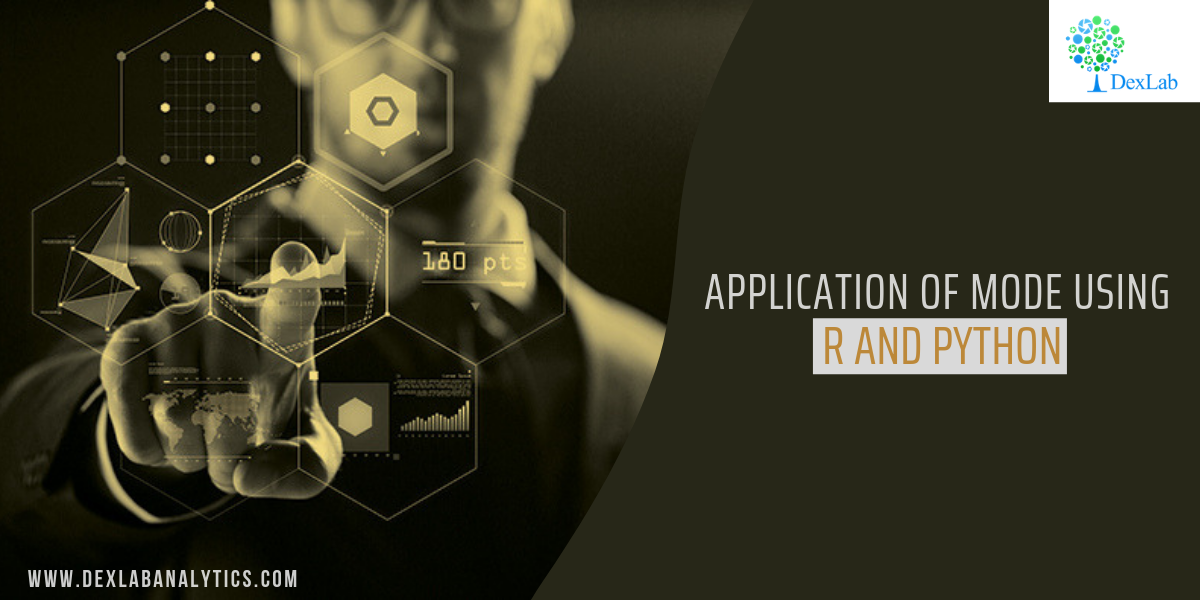
Mode, for a given set of observations, is that value of the variable, where the variable occurs with the maximum or the highest frequency.
This blog is in continuation with STATISTICAL APPLICATION IN R & PYTHON: CHAPTER 1 – MEASURE OF CENTRAL TENDENCY. However, here we will elucidate the Mode and its application using Python and R.
Mode is the most typical or prevalent value, and at times, represents the true characteristics of the distribution as a measure of central tendency.

Application:
The numbers of the telephone calls received in 245 successive one minute intervals at an exchange are shown in the following frequency distribution table:
No of Calls | Frequency |
0 | 14 |
1 | 21 |
2 | 25 |
3 | 43 |
4 | 51 |
5 | 40 |
6 | 51 |
7 | 51 |
8 | 39 |
9 | 12 |
Total | 245 |
[Note: Here we assume total=245 when we calculate Mean from the same data]
Evaluate the Mode from the data.

Calculate Mode in R:

Calculate mode in R from the data, i.e. the most frequent number in the data is 51.
The number 51 repeats itself in 5, 7 and 8 phone calls respectively.
Calculate Median in Python:
First, make a data frame for the data.

Now, calculate the mode from the data frame.

Calculate mode in Python from the data, i.e. the most frequent number in the data is 51.
The number 51 repeats itself in 5, 7 and 8 phone calls respectively.
Mode is used in business, because it is most likely to occur. Meteorological forecasts are, in fact, based on mode calculations.
The modal wage of a group of the workers is the wages which the largest numbers of workers receive, and as such, this wage may be considered as the representative wage of the group.
In this particular data set we use the mode function to know the occurrence of the highest number of phone calls.
It will thus, help the Telephone Exchange to analyze their data flawlessly.
Note – As you have already gone through this post, now, if you are interested to know about the Harmonic Mean, you can check our post on the APPLICATION OF HARMONIC MEAN USING R AND PYTHON.
Dexlab Analytics is a formidable institute for Deep learning for computer vision with Python. Here, you would also find more information about courses in Python, Deep Learning, Machine Learning, and Neural Networks which will come with proper certification at the end.
We are there in the Social Media where you can follow us both in Facebook and Instagram.
Interested in a career in Data Analyst?
To learn more about Data Analyst with Advanced excel course – Enrol Now.
To learn more about Data Analyst with R Course – Enrol Now.
To learn more about Big Data Course – Enrol Now.To learn more about Machine Learning Using Python and Spark – Enrol Now.
To learn more about Data Analyst with SAS Course – Enrol Now.
To learn more about Data Analyst with Apache Spark Course – Enrol Now.
To learn more about Data Analyst with Market Risk Analytics and Modelling Course – Enrol Now.
deep learning certification, deep learning course, Deep Learning Training, Deep Learning Training Courses, Deep learning Training Institutes, Machine Learning, Machine Learning Certification, Machine Learning course, Machine Learning course in Gurgaon, Machine Learning course online, Machine Learning Courses, Python, Python certification, python certification course, Python courses, Python Training Institute, Software tools : SAS, R, Python etc


Comments are closed here.